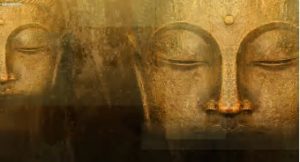Practice Circle: See Confusion as Buddha
 I love the Tibetan Lojong slogans because so many of them provocatively explore the dharma from angles that we can tend to overlook. I often initially react negatively toward them, because they are trying shock us into understanding our practice in new ways. The slogan we will work with at Practice Circle on July 23, 2017, certainly has this effect. “See confusion as Buddha and practice emptiness,” as Norman Fischer renders it in the book we’ve been working with, Training in Compassion.
I love the Tibetan Lojong slogans because so many of them provocatively explore the dharma from angles that we can tend to overlook. I often initially react negatively toward them, because they are trying shock us into understanding our practice in new ways. The slogan we will work with at Practice Circle on July 23, 2017, certainly has this effect. “See confusion as Buddha and practice emptiness,” as Norman Fischer renders it in the book we’ve been working with, Training in Compassion.
Tradition presents an image of the Buddha as far from confused: He’s not only wise to the ways of every human mind, but his understanding extends beyond time and space, life and death. The traditional Buddha is a superhuman extension of our desire for perfect comprehension of our circumstances and our wish for a secure future. We imagine that our habitual ways of perception and thinking are a reliable representation of the world.
This is why we react with panic and dismay when life violates our expectations, as it so often does. News of a senseless act of violence, an upsetting reversal in our personal lives, even a nasty remark from a coworker — they all set our minds reeling with confusion. How could this happen? What does this say about who I am, who other people are? How can I trust myself or anyone else when such things are possible?
Even our dharma practice can be confusing. Am I having the kind of experience I’m supposed to be having? Am I doing this right? I was so peaceful and clear when I sat yesterday — why can’t I be that way now? I’ve been practicing so many years — why do I still lose my temper and act in ways that cause suffering? The profound wisdom of the sage under the Bodhi tree often seems very far away.
In our practice and in daily life, confusion is a sign that our experience is not complying with our expectations. But why should it? The careful examination of our experience that dharma practice calls us to reveals that nothing has the solid, fixed, dependable nature we presume it to have. “See confusion as Buddha” invites us to use perplexity as an object of contemplation. It’s a good habit to get into, first because we have plenty of opportunities to do it, and second because such moments make the fictional nature of our mental preconceptions so obvious. Such a practice helps us adopt an attitude of “don’t-know-mind”, of recognizing the futility of the identities we insist on imposing on the world, and letting them go. Relaxing into this space of unknowing is what the slogan means by “practice emptiness.”
Fischer writes:
If we could unhook ourselves for a moment from the blaming and the wishing and the self pitying and could look instead at the actual basis of what is in fact going on, what would we see? We would see things changing. We would see life arising and passing away, coming from nowhere and going nowhere. Moment by moment, time slips away and things transform. The present becomes the past — or does it become the future? And yet right now there is no past or future. As soon as we examine “now” it is gone. And we cannot know how or where it goes. This may sound like philosophy, but it doesn’t feel like philosophy when you or someone close to you is giving birth. If at that moment you are standing in the delivery room or are yourself, in pain and joy, giving birth — in that first bursting-forth moment, you are amazed. This small life you think you have been living, with its various issues and problems, completely disappears in the face of the miracle of visceral life springing forth in front of your eyes. Or if you are present when someone leaves this world and enters death (if there is such a place to enter), breathes his or her last and is gone, you know then that this emptiness is not just philosophy. You may not know what it is, but you will know that it is real. And that this reality is powerful and makes you see your life, and the whole of life, quite differently in that moment. A new context emerges that is more than what you thought, more than concept. When you view your daily human problems in the light of actual birth and actual death, you are practicing with this slogan. Every moment of your life, even, (and maybe especially) your moments of pain or despair or confusion, is a moment of Buddha.
When Practice Circle meets again this Sunday, July 23rd at 6 Pacific, 8 Central and 9 Eastern time, we’ll try seeing confusion as Buddha, and practicing emptiness. I hope you’ll join us! To join our video conference group, simply follow this link: https://zoom.us/j/968569855
